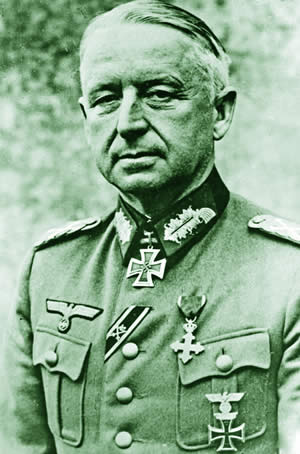
One of the greatest generals of World War II was born in 1887 in Berlin. He fought and was wounded in World War I, and commanded the 18th Division in Silesia after the war. He first came to prominence in early 1940, when his plan for an armoured attack through the Ardennes caught Hitler’s attention. The Führer liked the plan, which he adopted and launched with great success. However, Manstein had upset the General Staff and so he was “banished” to Silesia to help form the new XXXVIII Corps.
He was given command of LXI Panzer Corps for the invasion of the USSR in 1941 as part of Army Group North, and then appointed head of the Eleventh Army in September 1941 and ordered to conquer the Crimea. The subsequent campaign in the Crimea was one of the epics of the war on the Eastern Front. Sevastopol fell in July 1942, and Manstein was made a field marshal in the same month. He was then ordered north again, and successfully destroyed a Red Army penetration south of Leningrad in September 1942. At the end of 1942 Manstein was ordered south again, this time to rescue the Sixth Army trapped in Stalingrad. His relief force got to within 56km (35 miles) of the German lines, before it was driven back by the Soviets. In early 1943, the Red Army steamroller smashed into the Ukraine, and it appeared that the whole of the German front in southern Russia was about to collapse. However, Manstein delivered a devastating counterattack against the Red Army that recaptured Kharkov, killed 23,000 enemy soldiers and stabilized the front. It was one of the greatest examples of the expert use of mobile tactics on the Eastern Front. His ideas about an elastic defence were, however, at odds with those of Hitler. Manstein was sent into retirement in April 1944. After the war he wrote his autobiography, Lost Victories, one of the best accounts of command during World War II. Manstein died in Germany in 1973 at the age of 85.
